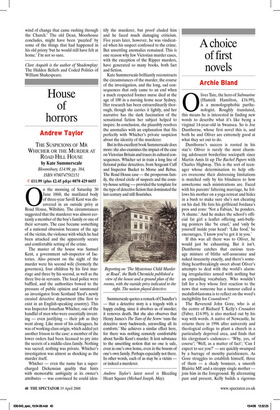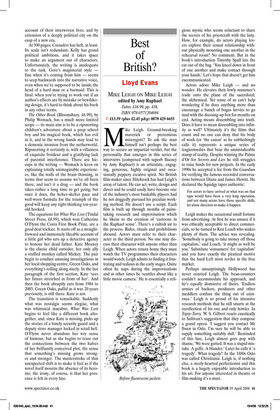A choice of first novels
Archie Bland
Oliver Tate, the hero of Submarine (Hamish Hamilton, £16.99), is a monologophobic parthenologist. Roughly translated, this means he is interested in finding new words to describe what it’s like being a virginal 14-year-old in Swansea. So is Joe Dunthorne, whose first novel this is, and both he and Oliver are extremely good at what they set out to do.
Dunthorne’s success is rooted in his star’s: Oliver is surely the most charming adolescent borderline sociopath since Martin Amis lit up The Rachel Papers with Charles Highway. This is the sort of teenager whose determination to help others overcome their distressing limitations is matched only by his blindness to how unwelcome such ministrations are. Faced with his parents’ faltering marriage, he follows his mother on a yoga retreat and hides in a bush to make sure she’s not cheating on his dad. He lists his girlfriend Jordana’s pros and cons: ‘Not a Fabian,’ he ponders. ‘A shame.’ And he makes the school’s official fat girl a leaflet offering anti-bullying pointers like ‘be cruel,’ and ‘only be yourself inside your head’: ‘Like food,’ he encourages, ‘I know you’ve got it in you.’ If this was all there was to Oliver, he would just be exhausting. But it isn’t. Dunthorne catches that curious teenage mixture of blithe self-assurance and naked insecurity exactly, and there’s something heartbreakingly sweet about Oliver’s attempts to deal with the world’s alarming irregularities armed with nothing but an expanding vocabulary. Who wouldn’t fall for a boy whose first reaction to the news that someone has a tumour called a medulloblastoma is to reflect on the word’s ineligibility for Countdown?
The Reverend John Gore, who is at the centre of Richard T. Kelly’s Crusaders (Faber, £14.99), is also marked out by his way with words. A native of Newcastle, he returns there in 1996 after university and theological college to plant a church in a particularly deprived area, and finds that his clergyman’s cadences— ‘Why, yes, of course’; ‘Well, as a matter of fact’; ‘Can I expect to see you?’ — are quickly swamped by a barrage of mouthy parishioners. As Gore struggles to establish himself, three of them — a shady bouncer, a smooth Blairite MP, and a stroppy single mother — join him in the foreground. By alternating past and present, Kelly builds a rigorous account of their interwoven lives, and by extension of a deeply political city on the cusp of a new era.
At 500 pages, Crusaders has heft, at least. Its scale isn’t redundant: Kelly has grand political ambitions, and it takes space to make an argument out of characters. Unfortunately, the writing is inadequate to the task. Gore’s magisterial style — fine when it’s coming from him — seems to seep backwards into the narrative voice, even when we’re supposed to be inside the head of a hard man or a barmaid. This is fatal: when you’re trying to work out if an author’s effects are by mistake or bewildering design, it’s hard to think about his book in any other terms.
The Other Book (Bloomsbury, £6.99), by Philip Womack, has a much more limited scope — its main aim is to be a ripsnorting children’s adventure about a prep school boy and his magical book, which has evil in it, and in the wrong hands may lead to a demonic invasion from the netherworld. Ripsnorting it certainly is, with a villainess of exquisite froideur and a gratifying lack of parental interference. There are hiccups in the writing — Womack is keen on explaining totally unimaginable experiences, like the walls of the brain thinning, in terms that seem to assume we’ve all been there, and isn’t it a drag — and the book takes rather a long time to get going; but once it does, the helter-skelter pace and well-worn formula for the triumph of the good will keep any right-thinking ten-yearold hooked.
The equations for What Was Lost (Tindal Street Press, £8.99), which won Catherine O’Flynn the Costa First Book Prize, are a good deal trickier. It starts off as a straightforward and immensely likeable account of a little girl who sets up a detective agency to honour her dead father. Kate Meaney is the classic child outsider, her only ally a stuffed monkey called Mickey. The pair begin to conduct amusing investigations in her local shopping centre, Green Oaks, and everything’s rolling along nicely. In the last paragraph of the first section, Kate ‘sees her future stretched in front of her’. And then the book abruptly cuts from 1984 to 2003. Green Oaks, pallid as it was 20 years previously, is still there. Kate is not.
The transition is remarkable. Suddenly what was nostalgic seems elegiac, what was whimsical macabre; What Was Lost begins to feel like a different book altogether, and, since Kate is missing, picks up the stories of a lonely security guard and a deputy store manager locked in retail hell. O’Flynn never abandons her wry sense of humour, but as she begins to tease out the connections between the two halves of her brilliantly conceived plot, the sense that something’s missing grows stronger and stronger. The masterstroke of that unexpected shift is to make it feel as if the novel itself mourns the absence of its heroine; the irony, of course, is that her presence is felt in every line.



















































































 Previous page
Previous page